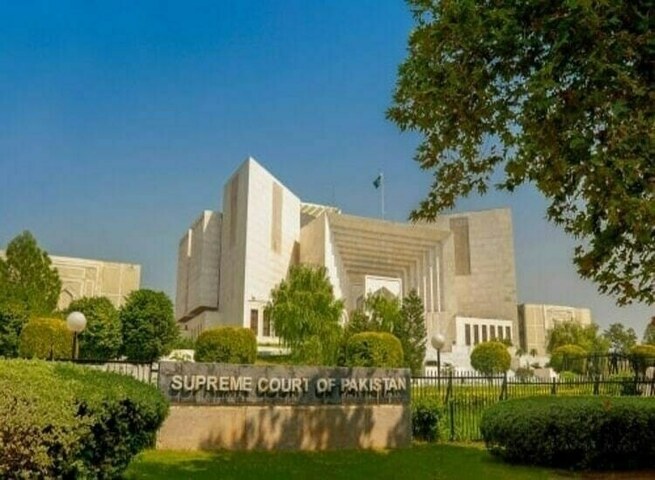By Terence J Sigamony
Copyright brecorder

ISLAMABAD: Justice Aminuddin Khan, the head of the Constitutional Bench of the Supreme Court of Pakistan, on Wednesday emphasized the need for adhering to the existing Constitution, which contains the 26th Amendment, until any further amendments are formally enacted.
He stated this while presiding over an eight-member Constitutional Bench of the Supreme Court that on Wednesday heard the petitions of bar council/association, former Chief Justice of Pakistan Jawad S Khawaja, leader of Tehreek-e-Tahaffuz Aayin-e-Pakistan Mustafa Nawaz Khokhar. The hearing was live-streamed on the apex court’s official YouTube channel.
At the outset of the hearing, Hamid Khan, representing the Lahore High Court Bar Association (LHCBA), contended that the Full Court, comprising 16 judges, was in place when the 26th Amendment was passed.
26th amendment case: SC allows live streaming of proceedings
He argued that those eight judges who were in the Supreme Court at that time should also be included in this bench, hearing the 26th amendment case.
“Let this bench be expanded and a 16-judge bench hear the petitions,” he added.
Justice Jamal Khan Mandokhail questioned Hamid Khan, asking, “Do you agree that the 26th Amendment is part of the Constitution.”
When Hamid contended that it was not valid legislation, Justice Jamal interrupted, stating that the question of its validity would be addressed at a later stage. For now, he affirmed, the 26th Amendment remains part of the Constitution.
Justice Amin emphasized that both judges and lawyers are bound by the Constitution and must adhere to it unless the 26th Amendment is declared otherwise. “Until such a decision is made, we have to abide by the present Constitution,” he added.
Justice Musarrat Hilali reminded the counsel that they were before the Constitution Bench due to the 26th Amendment, noting that no court has yet declared it ultra vires the Constitution.
The LHCBA’s counsel urged the bench to consider the situation as of the date when the 26th Amendment was enacted. Justice Muhammad Ali Mazhar directed him to limit his arguments to the constitution of the bench and refrain from delving into the merits of the case.
Hamid contended that one of the salient features of the constitution is the independence of the judiciary, which is affected by the 26th Amendment, as it has changed the formation of the Judicial Commission of Pakistan (JCP).
He further noted that for the first time, the power of constitution of benches is taken away from the Chief Justice of Pakistan.
Justice Aminuddin questioned how, in the absence of the 26th Amendment, a 16-member bench could have been constituted to hear the petitions.
Justice Mazhar said the JCP according to Article 191A nominates the judges for the Constitutional Bench, and does not constitute benches and fix the cases. It is the job of Committees, formed under Supreme Court (Practice and Procedure) Act, 2023 and Article 191A of the constitution to decide about benches and fix cases before them, he added.
Justice Jamal remarked that when Article 58(2)(b) was part of the Constitution it was used [to remove prime ministers] but now it is no more part of the constitution. Upon that Hamid asked the bench that for the moment ignore Article 191A.
Justice Mandokhel questioned whether the bench had the authority to render any provision of the Constitution redundant.
Justice Mazhar referred to Article 5 of the Constitution, stating, “Loyalty to the State and obedience to the Constitution and law is the basic duty of every citizen.”
He further remarked that Article 191A is part of the Constitution, yet the counsel was asking the court to disregard it in order to constitute a full court.
Justice Mazhar asked the LHCBA counsel to point out the constitutional provision under which the court could order the formation of a full court.
“Tell us from the Constitution, how can we order for a full court? Can we issue this order using Article 187?” he inquired. In response, Hamid Khan maintained, “Yes, absolutely, the court can exercise its powers under Article 187.”
Khan further submitted that since 1955, all major cases involving constitutional questions had been heard by a full court.
At this, Justice Mandokhel asked, “Suppose we accept your point and consider all Supreme Court judges as members of the Constitutional Bench – would you then be satisfied.”
In response, Khan conceded, “The concept of a Constitutional Bench was introduced by the 26th Amendment.”
Justice Jamal reminded the counsel that the 26th Amendment had been passed by Parliament, remarking, “So don’t blame the Court.”
When Hamid Khan once again urged the bench to “ignore Article 191A for a moment,” Justice Mazhar sharply responded, “If we ignore it, then the Constitutional Bench ceases to exist, then why are we even sitting here.”
Justice Aminuddin warned that disregarding Article 191A would undermine the very foundation of the apex court. “If we ignore Article 191A, the Supreme Court itself would cease to exist,” he remarked.
Justice Jamal added, “If the existence of this Constitutional Bench ends, then how can we issue any orders.” During the proceedings, Justice Ayesha Malik observed that there was no constitutional bar on forming a full court through a judicial order.
“Where is it written in the 26th Amendment that there can’t be a judicial order,” she asked, questioning why such a direction could not be issued in the instant case, particularly when it had been done in other cases.
The case was adjourned till Thursday at 11:30am.
Copyright Business Recorder, 2025